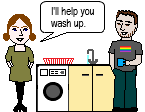Read about when we use will + verb (sometimes called the future simple) below. Then try these exercises to practise using will to talk about the future.
Using will (the future simple)
 There are lots of different reasons to use the verb will (or the negative won't). For example:
There are lots of different reasons to use the verb will (or the negative won't). For example:
- Predictions:
I don't think I'll get that job. - Facts about the future:
I'll be 33 in May. - Promises:
I'll phone you later, I promise! - Threats:
Do that again and I'll kill you! - Requests:
Will you help me? - Offers:
I'll help you with the washing up. - Spontaneous decisions (decisions made at the time of speaking):
I'm hot. I think I'll open the window.
How to make the future simple
We make the future simple with will/won't + verb. The form is the same for I, you, he, she, it, we and they.
Positive: I'm sure he'll forget my birthday.
Negative: I'm sure he won't forget your birthday.
Questions: For offers and suggestions with we and I, we make questions with shall + we / I + verb.
Shall I open the window? (offer)
Shall we go out tonight? (suggestion)
For all other questions, use will.
Will I ever fall in love? (prediction)
When will he arrive? (fact)
Will you fix my computer? (request)
When you are ready, try these exercises to practise using will and shall.
